The European Union (EU) has proposed an increase in energy efficiency of 32.5% by 2030, and Romania is due to take over this provision in national legislation in the coming months, Zoltan Nagy-Bege, vice-president of the National Regulatory Authority for Energy (ANRE), in a dedicated conference.
“This year the European Energy Performance of Buildings Directive was approved, and in July it was published in the Official Journal of the European Union. The Member States have 20 months to take over its provisions in the national legislation”, the ANRE official stated.
“Romania’s 2020 targets for both energy efficiency (20% – e.n.) and renewable resources of 24% have already been exceeded, according to Eurostat. We are waiting for the publication in the Official Journal of all the directives in this energy and climate package, then we will have to take them over. During the Austrian Presidency [of the Council of the EU], discussions on the Energy Market Directive should be finalized, but if they are not completed, we would have the chance to continue and complete these discussions during the Romanian Presidency”, added Nagy-Bege.
He pointed out that the Directive stipulates that the new target for increasing energy efficiency will be 32.5%, by 2030. At the same time, for renewable sources, there is a target of 32% for 2030, at European level, with the possibility of further revision in 2023.
He reminded that, in respect with buildings, energy consumption represents 40% of total energy consumption in Europe, and 45% in Romania. A week ago, in an event organized by energynomics.ro and DK-Expo, the ANRE official announced the resumption of talks with the parties involved in an ESCO framework contract, already used by industrial agents, but hardly at all by public authorities. “We have established a working group to meet weekly to propose this document,” said Zoltan Nagy-Bege.
“The buildings sector is responsible for one third of the carbon dioxide emissions; 75% of the buildings in the European Union are energetically inefficient”, said ANRE vice president.
On Tuesday, Energy Policy Group has launched a study on increasing energy efficiency in buildings in Romania, for the Association for the Promotion of Energy Efficiency in Buildings – ROENEF.
Romania, ranked fourth in the EU in utilities arrears
The study, coordinated by Radu Dudău, co-founder and director of EPG, formulates several policy conclusions and recommendations for priority actions aimed at facilitating the deep renovation of the real estate fund in Romania:
- establishment of programs financed from public funds for the renovation of buildings inhabited by people in energy poverty
- achieving an annual renovation rate of 3% for public buildings
- support for the installation of RES systems in buildings
- the introduction of an energy efficiency obligation scheme based on minimum standards
- maximizing the absorption of European funds
- developing the regulatory framework for ESCOs and energy performance contracts
- support for “green loans”
- establishing a support scheme for the renovation of single-family houses, including a bonus for the use of “green” heat insulating materials
- the introduction of quality standards, in addition to cost standards, among the criteria for funding under the Regional Operational Program
